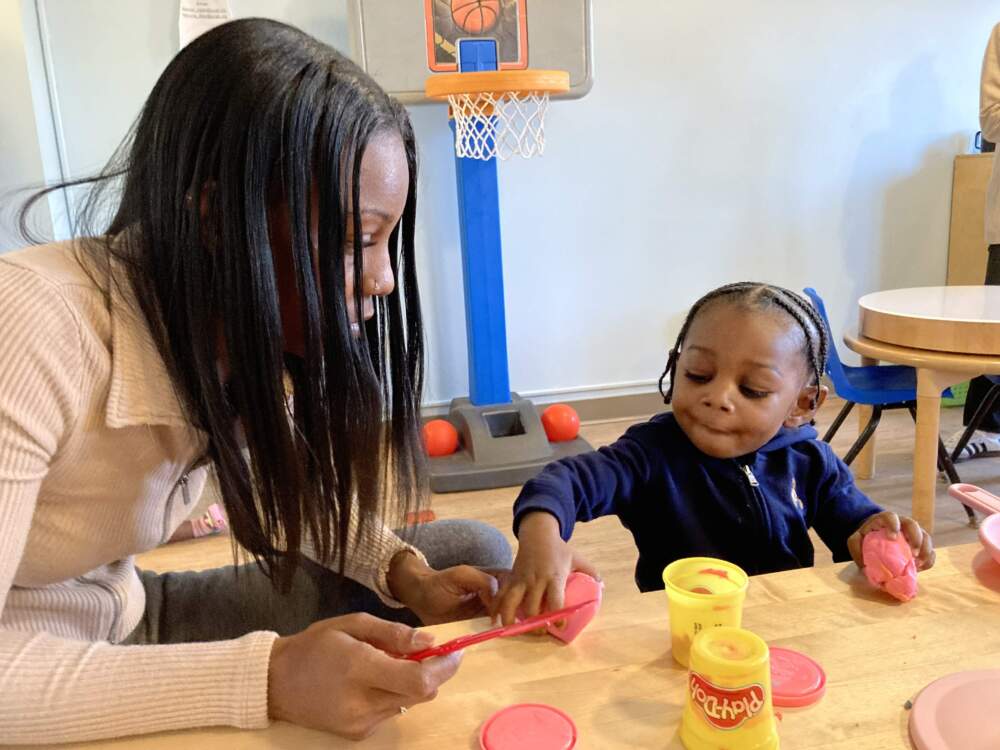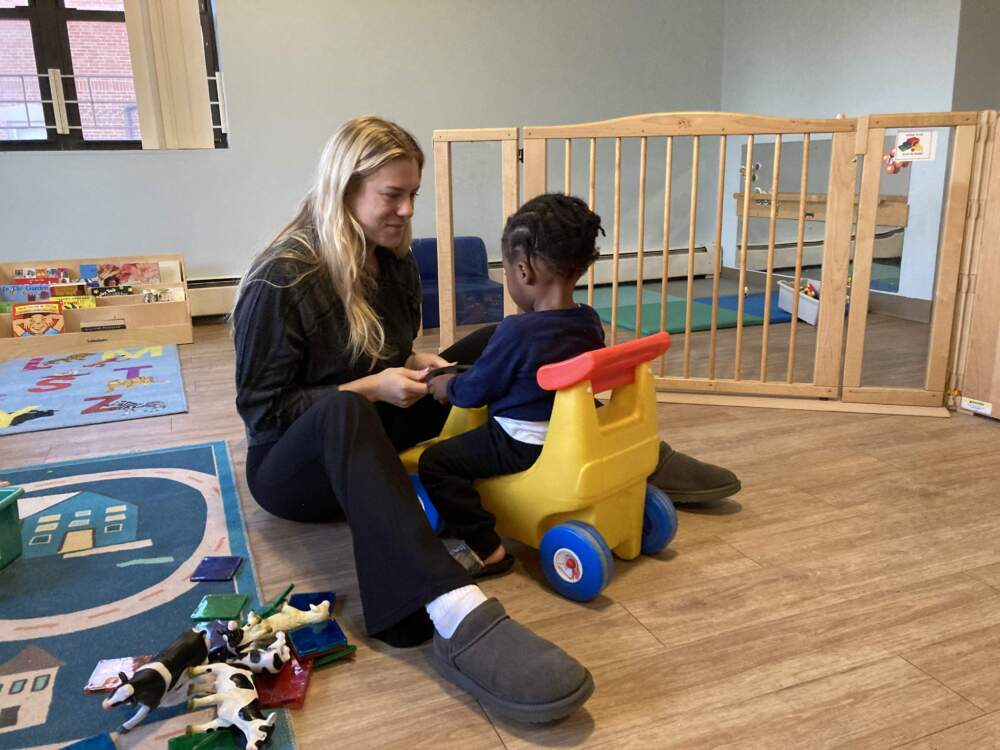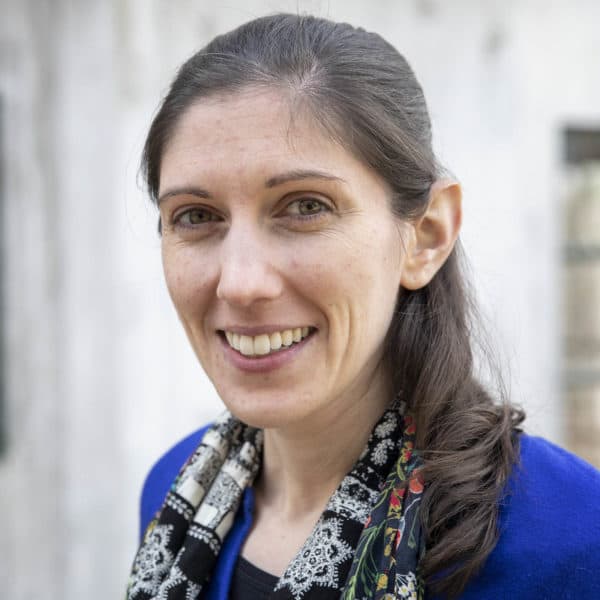Advertisement
The youngest kids in Mass. shelters need more support, advocates warn

Jazzmine Pryor looks forward to Tuesday nights. That’s when a small room opens up at the end of the second floor hallway in the Boston shelter where Pryor lives. It’s a playroom with a dress-up corner, a book nook and a little basketball hoop, among other toys and activities.
Pryor’s 20-month-old son, Davon, likes to play with big magnetic letters by the door. He’s just beginning to talk, but he’s already learned the alphabet.
Davon loves coming to this playroom, which is open two nights a week. He loves it so much that he sometimes cries when it’s time to leave.
Pryor enjoys it too. She likes that Davon socializes with the volunteers, plus it’s nice to get a rare moment to herself.
“It's a great help," she said. "I'm able to get some things done, chores and cook dinner and stuff like that.”
As a child, Pryor lived in a shelter with her mom, and she remembers the playroom there, but spaces like these are far from a guarantee today.
In the past year, the Massachusetts family shelter system has doubled in size, and more than 3,000 households are now in hotels and motels that often don’t have toys, books or places for children to play.
In the state’s shelter system as a whole, there are more than 10,000 children. State officials estimate that about half are too young for school, which means they may not get the services and enrichment that classrooms can offer.
A new push from advocates and state agencies aims to get these youngsters better access to playrooms, playgrounds and enriching activities.
‘Picking at the rug’
When Rita Sears, from the nonprofit Making Opportunity Count, became the manager of a hotel-turned-shelter in Concord, she immediately noticed there was nothing for kids to do.
“A lot of them were just sitting around, not really doing much — picking at the rug, the carpet, the walls,” she said.
Other kids, she observed, had lots of energy and nowhere to get it out.
“When you're trying to get work done, and you hear 15 kids running up and down the hall, it's a lot,” Sears said. “It was very evident that we needed something for the kiddos.”
“When you're trying to get work done, and you hear 15 kids running up and down the hall, it's a lot. It was very evident that we needed something for the kiddos.”
Rita Sears
Sears teamed up with Horizons for Homeless Children, an organization that provides early education and services for homeless children under 5. Together, they created a play space at the hotel by revamping a small gym. It’s similar to the one the organization built years earlier in the shelter where Pryor lives with her son.
Both spaces are beloved by families, but both have limited space and are only open a handful of hours each week, when there are enough volunteers to supervise the children. With over 300 shelter residents in Concord, Sears said, a long line of people forms as soon as sign-up sheets are posted.
“There's so much demand,” Sears said. “We're begging for volunteers so that we can add more play space days.”
Even with demand outstripping spots, Sears and others at Making Opportunity Count say the playroom has transformed the ethos in the shelter.
“The families having this opportunity that they never had when we first moved in has created this calmness — like there's something to look forward to,” said Colby O’Brien, the senior director of programs at Making Opportunity Count.
Advertisement
He said the play space is used throughout the week for various purposes, including visits with developmental and physical therapists working with children who have fallen behind in areas like language development and physical dexterity.
“This space has been the springboard for everything we're doing in the shelter relating to kids,” O’Brien said.

Family shelters are located in more than 90 cities and towns across the commonwealth, and facilities can vary greatly from one shelter to the next.
In August, Heidi Porter, director of health and human services in Bedford, discovered the state had placed homeless families in a hotel in her town without any staff to provide shelter services.
“There's no play space at the hotel. There's no park nearby,” she said.
Porter noticed the enormous smiles on the faces of kid going to kindergarten when they saw their school — and its playground — for the first time. She and other people in Bedford worked to find something similar for the younger children.
Since August, the need has only become more acute. Bedford’s shelter population has grown from 17 families to 92 families.
A couple of weeks ago, the recreation department set up an outdoor play space on town land a short walk from the hotel, Porter said. This week, a community group called Bedford Family Connection is setting up a playroom at the hotel with donated toys, games and books.
These improvements will help in Bedford, but they do little to tackle the challenges system-wide.
“What's happening now is everything's a one off,” said Kate Barrand, CEO of Horizons for Homeless Children. “We've got to step away and say, ‘OK, how do we solve this as a state?’”
‘We're deep in the mapping’
Barrand has spent years advocating for the importance of investing in educational experiences for homeless children who are too young to go to school. She points to research showing a stimulating environment is key for brain development in the first few years of life.
As Barrand emphasizes, the typical stay in a family shelter is over a year. It's an average Barrand expects to grow since many residents are new immigrants waiting for permission from the federal government to work so they can, eventually, support their families and move out of shelters.
“They will be in these hotels for very long periods of time,” Barrand said. “I know everyone keeps using the word temporary. This is not ending. There is no place for these families to go, particularly when they don’t have work permits.”
“I know everyone keeps using the word temporary. This is not ending. There is no place for these families to go."
Kate Barrand
Barrand has lots of ideas to propose, including bringing portable classrooms to hotel parking lots and training parents to become child care providers to fill the early education teacher deficit.
But for now, her organization is focused on building more play spaces. Horizons for Homeless Children has a contract with the state to build 12 new shelter playrooms over the next two years.
“We’ll go as fast as we can,” she said, but she acknowledges there are many more shelter sites that need play spaces.
Still, she’s optimistic. This fall she started working with state officials and advocates to help coordinate services for young children in the shelter system. The group has been figuring out what families need most.
“I would say we're deep in the mapping of where the families currently are, what the resources and needs are,” said Amy Kershaw, the Massachusetts commissioner of early education and care.
She said her agency is collaborating with other state agencies “to understand the full scope." The goal, she said, is to create new child-friendly spaces in shelters, connect families to outside resources and meet basic needs, like providing winter coats.
"Many of these children obviously don't have toys or clothes with them that match the current moment and the season," Kershaw said.
A spokesperson from the state's Executive Office of Education said state grants are helping support 15 new shelter playgroups, with 20 more on the way. The state is also making it easier for parents to apply for subsidized child care.
Amy O’Leary, who runs the advocacy group Strategies For Children, participates in a new, weekly video conference with state officials, shelter advocates and child care providers to think through what this age group needs.
“I was very encouraged to see this infrastructure starting," said O’Leary. "I don't know the timeline, but I think there is an a awareness and a kind of urgency to figure this out."
O’Leary and other child advocates emphasized that it’s still early in the state’s response, but they’re hopeful this new focus will benefit the shelter system’s littlest residents.
This segment aired on October 25, 2023.
